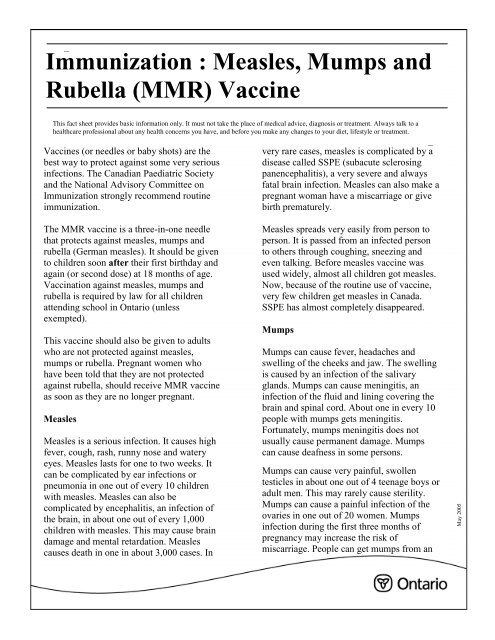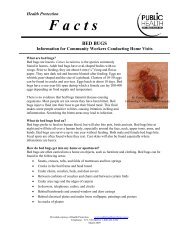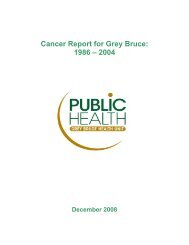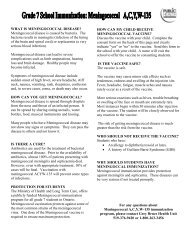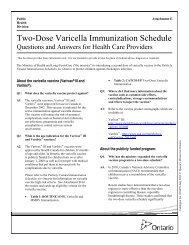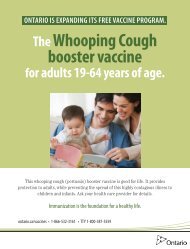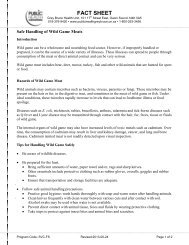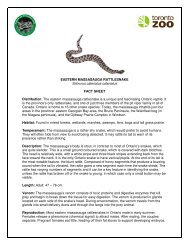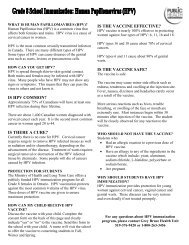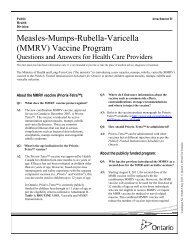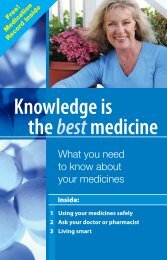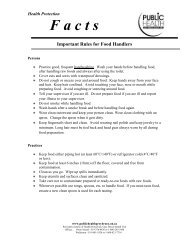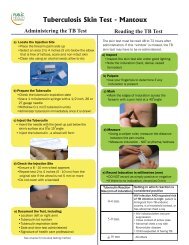Immunization : Measles, Mumps and Rubella (MMR) Vaccine
Immunization : Measles, Mumps and Rubella (MMR) Vaccine
Immunization : Measles, Mumps and Rubella (MMR) Vaccine
You also want an ePaper? Increase the reach of your titles
YUMPU automatically turns print PDFs into web optimized ePapers that Google loves.
<strong>Immunization</strong> : <strong>Measles</strong>, <strong>Mumps</strong> <strong>and</strong><strong>Rubella</strong> (<strong>MMR</strong>) <strong>Vaccine</strong>This fact sheet provides basic information only. It must not take the place of medical advice, diagnosis or treatment. Always talk to ahealthcare professional about any health concerns you have, <strong>and</strong> before you make any changes to your diet, lifestyle or treatment.<strong>Vaccine</strong>s (or needles or baby shots) are thebest way to protect against some very seriousinfections. The Canadian Paediatric Society<strong>and</strong> the National Advisory Committee on<strong>Immunization</strong> strongly recommend routineimmunization.very rare cases, measles is complicated by adisease called SSPE (subacute sclerosingpanencephalitis), a very severe <strong>and</strong> alwaysfatal brain infection. <strong>Measles</strong> can also make apregnant woman have a miscarriage or givebirth prematurely.The <strong>MMR</strong> vaccine is a three-in-one needlethat protects against measles, mumps <strong>and</strong>rubella (German measles). It should be givento children soon after their first birthday <strong>and</strong>again (or second dose) at 18 months of age.Vaccination against measles, mumps <strong>and</strong>rubella is required by law for all childrenattending school in Ontario (unlessexempted).This vaccine should also be given to adultswho are not protected against measles,mumps or rubella. Pregnant women whohave been told that they are not protectedagainst rubella, should receive <strong>MMR</strong> vaccineas soon as they are no longer pregnant.<strong>Measles</strong><strong>Measles</strong> is a serious infection. It causes highfever, cough, rash, runny nose <strong>and</strong> wateryeyes. <strong>Measles</strong> lasts for one to two weeks. Itcan be complicated by ear infections orpneumonia in one out of every 10 childrenwith measles. <strong>Measles</strong> can also becomplicated by encephalitis, an infection ofthe brain, in about one out of every 1,000children with measles. This may cause braindamage <strong>and</strong> mental retardation. <strong>Measles</strong>causes death in one in about 3,000 cases. In<strong>Measles</strong> spreads very easily from person toperson. It is passed from an infected personto others through coughing, sneezing <strong>and</strong>even talking. Before measles vaccine wasused widely, almost all children got measles.Now, because of the routine use of vaccine,very few children get measles in Canada.SSPE has almost completely disappeared.<strong>Mumps</strong><strong>Mumps</strong> can cause fever, headaches <strong>and</strong>swelling of the cheeks <strong>and</strong> jaw. The swellingis caused by an infection of the salivarygl<strong>and</strong>s. <strong>Mumps</strong> can cause meningitis, aninfection of the fluid <strong>and</strong> lining covering thebrain <strong>and</strong> spinal cord. About one in every 10people with mumps gets meningitis.Fortunately, mumps meningitis does notusually cause permanent damage. <strong>Mumps</strong>can cause deafness in some persons.<strong>Mumps</strong> can cause very painful, swollentesticles in about one out of 4 teenage boys oradult men. This may rarely cause sterility.<strong>Mumps</strong> can cause a painful infection of theovaries in one out of 20 women. <strong>Mumps</strong>infection during the first three months ofpregnancy may increase the risk ofmiscarriage. People can get mumps from anMay 2005
infected person coughing or sneezing aroundthem or simply talking to them. It can also bespread through contact with the saliva of aninfected person.<strong>Rubella</strong> (German <strong>Measles</strong>)<strong>Rubella</strong> is very dangerous in pregnantwomen. If a woman gets rubella in the earlypart of a pregnancy, it is very likely that herbaby will die or be severely h<strong>and</strong>icapped.The most common h<strong>and</strong>icaps are blindness,deafness, mental retardation <strong>and</strong> heartdefects.<strong>Rubella</strong> is usually a mild illness in children;up to half of the infections with rubella occurwithout a rash. The disease can be moresevere in older children <strong>and</strong> adults especiallywomen. <strong>Rubella</strong> may cause fever, sore throat,swollen gl<strong>and</strong>s in the neck <strong>and</strong> a rash on theface <strong>and</strong> neck. Temporary aches <strong>and</strong> pains<strong>and</strong> swelling of the joints are common inadolescents <strong>and</strong> adults, especially females.<strong>Rubella</strong> can be followed by chronic arthritis.It can also cause temporary blood clottingproblems <strong>and</strong> encephalitis (swelling of thebrain).<strong>Rubella</strong> spreads by contact with an infectedperson through coughing, sneezing or talkingto them. It can also be spread by contact withthe saliva of infected people.How well does <strong>MMR</strong> vaccine protectagainst measles, mumps <strong>and</strong> rubella?The vaccine protects about 99 per cent ofthose who get both needles against measles.It protects 95 per cent of people againstmumps <strong>and</strong> about 98 per cent of peopleagainst rubella. Protection from measles,mumps <strong>and</strong> rubella after getting the vaccineis probably life-long. Vaccination also makesthese diseases milder for those who maycatch them.Is the <strong>MMR</strong> vaccine safe?Yes. Most children will have no side effects.<strong>MMR</strong> vaccine can cause a rash or fever insome children five to 12 days after the needleis given. This may last for a few days.Occasionally, a high fever can cause aconvulsion. The convulsion comes from thehigh fever caused by the vaccine rather thanthe vaccine itself. This does not make thechild any more likely to get epilepsy, braindamage or any other nerve problems.Convulsions caused by high fever are morelikely to occur in children who have hadconvulsions before or whose parents,brothers or sisters have had convulsions.The mumps part of the vaccine may causefever <strong>and</strong> swelling of the gl<strong>and</strong>s in the neck.Meningitis (an infection of the fluid <strong>and</strong>lining covering the spinal cord) may occurvery rarely, in one in 800,000 people who getthe vaccine. The meningitis caused bymumps vaccine is mild, <strong>and</strong> permanent braindamage does not occur.The rubella part of the vaccine may cause amild fever, rash or swelling of the gl<strong>and</strong>s inthe neck in one out of seven children. Thisusually happens 6 to 10 days after getting theshot <strong>and</strong> lasts for one to 2 days. Less than onein 200 children may develop swelling <strong>and</strong>pain in some joints after the vaccine. Up toone in four teenage girls <strong>and</strong> adult womenmay get painful swelling of some jointswithin one to three weeks after vaccination.The joint pain <strong>and</strong> swelling usually lasts onlya few days. Very rarely, chronic arthritis mayoccur.Mild, temporary blood clotting problemshave been reported during the month
following immunization with <strong>MMR</strong> vaccine.This condition occurs rarely <strong>and</strong> does notresult in long-term problems.There is no risk of a pregnant woman oranyone else catching measles, mumps orrubella from a child who has been vaccinatedrecently. It is safe to give this vaccine towomen who are breastfeeding. On the whole,the benefits of the vaccine are much greaterthan the risks. You should always discussthe benefits <strong>and</strong> risks of any vaccine withyour doctor.Who should not have <strong>MMR</strong> vaccine?The following children <strong>and</strong> adults should nothave <strong>MMR</strong> vaccine :• anyone who is ill with a fever orinfection worse than a cold;• anyone who has had a severe allergicreaction (called anaphylaxis) to aprior dose of this vaccine;• anyone taking medication that lowersthe body's ability to fight infections;• pregnant women : If a woman gets the<strong>MMR</strong> vaccine <strong>and</strong> then discovers sheis pregnant, she should call herdoctor. However, the risk of damageto the fetus in this type of situation issmall. Also women of childbearingage should be advised to avoidpregnancy for 1 month followingimmunization with <strong>MMR</strong> vaccine;• anyone who is allergic to an antibioticcalled neomycin;• anyone who received a gammaglobulin shot within the past three to12 months, (depending on the dose<strong>and</strong> method of administration).If you think that you or your child is in any ofthese groups, please talk to your doctor orpublic health unit.The <strong>MMR</strong> vaccine may be given to peoplewho are allergic to eggs even if they havehives, wheezing, difficulty breathing, orswelling of the face or mouth after eatingeggs, as long as they are observed after thevaccine for signs of a reaction.Who should I talk to if I have anyquestions?Talk to your doctor or call your local publichealth unit.Your record of protectionAfter you or your child receives anyimmunization, make sure the doctor updatesthe personal immunization record, such as the"Yellow Card". You will need to provide thisinformation to your local health unit whenyour child enters school <strong>and</strong> as they getadditional immunizations. Keep your recordsin a safe place !Government of OntarioFor information about health services <strong>and</strong>resources :www.health.gov.on.caFor consumer-friendly health tips <strong>and</strong>information :www.HealthyOntario.comINFOline: 1-877-234-4343;TTY: 1-800-387-5559Telehealth Ontario:1-866-797-0000; TTY 1-866-797-0007


